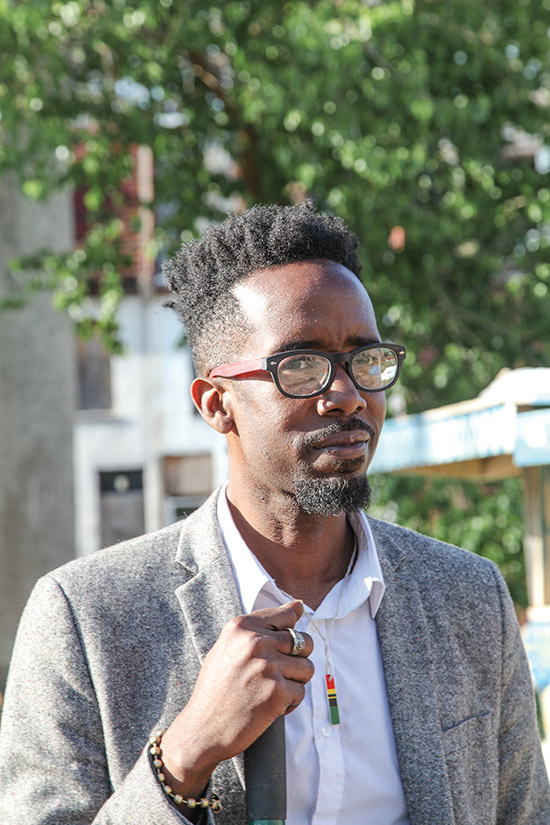Photo by Stephen Dyer | Community activist Tommy Joshua leads a group of progressive activists looking to make radical change in Philly neighborhoods
by Danielle Wayda
Community activist and educator Tommy Joshua is standing his ground. As the executive director of North Philly Peace Park, an urban garden and education space in the Sharswood neighborhood, Joshua leads a group of passionate and progressive activists who want to see radical change come to Philly neighborhoods that need it most—through food and community. The Philadelphia Housing Authority (PHA) had a different vision for the land where North Philly Peace Park is situated, and planned to build a mixed-income housing project there. Joshua’s tenacity might mean that the community’s needs for housing, fresh food and education are all addressed.
Sharswood, an enclave of north Philadelphia just above Girard College and southwest of the Temple sprawl, is where Joshua, 35, was born and raised. Although a native North Philadelphian, he spent most summers as a kid being “shipped off” to his aunt and uncle’s farm in Greensboro, North Carolina. “I was a hometown boy, but all the kids called me ‘country’ because I spent so much time on their farm,” he says, noting that his relative’s farm is where he picked up a love for ecology, along with some southern slang.
“Food can heal, mentally and physically,” he says, and his work with the Peace Park is an expression of his commitment to helping heal some of the ills that urban development have inflicted on Sharswood. After a bout with leukemia that interrupted his sophomore year at Temple and ended with a bone marrow transplant, Joshua says that changing the way he ate was a critical part of his recovery.
Founded in 2012, the Peace Park has since grown an impressive amount of food (nearly 3.5 tons of produce by the farmers’ estimation) and formed deep roots in the community. In its current location, the farm has a wide variety of vegetable plots, an orchard, playground and an education center, which was built in 2013. Community volunteers built an “earthship,” a structure made out of mostly recycled materials like tires and glass bottles, which became the Sala Nkrumah Schoolhouse, Joshua acts as the dean.
Classes and workshops held there—about anything from urban ecology to seed-saving to food-preserving—are an integral part of Joshua’s goal to fill a void of after-school activity options for local kids. In 2013, the nearby Roberts Vaux High School was shuttered two years ago due to budget cuts. (When he’s not organizing community events and work parties at the park or honing his skills as an “amateur arborist,” Joshua helps develop and implement after-school programs as an independent consultant.)
Around the same time, Joshua and the other park organizers began to hear rumblings that the PHA had plans to develop their lot into a multi-million dollar mixed-income housing project. In 2014, park leaders spent a lot of time attending community meetings and hearings with the PHA and the development company. They lobbied at City Hall, and eventually won the support of Councilman Darrell Clarke, who announced that the council would support the Peace Park in their negotiations with the PHA. In January 2015, Joshua and some of his neighbors had a brief standoff with a company hired by the PHA to conduct soil testing in the park’s lot—a drilling exercise that would have disrupted vegetable plots. Soon after, the PHA fenced off the park, which prevented community members from picking food and using the space freely as they had always done.
As negotiations with the PHA continued, PHA proposed several relocation sites in the neighborhood for the park, but until recently had not committed anything in writing. Joshua and other community leaders are reviewing a contract with the help of Amy Laura Cahn and the Garden Justice Legal Initiative, an arm of the Public Interest Law Center of Philadelphia. The contract promises a much larger plot of land at 25th & Jefferson. As of now, the community has regained access to the original park, events continue to be held at the schoolhouse, and work parties still happen on Sundays to get the farm in shape for the growing season.
It’s been a bumpy ride with the PHA, but Joshua is optimistic about the outcome. “We hope that our experience can give a framework for how other communities can navigate this process with the PHA going forward,” he says. “We want this whole thing to show the viability of what a community can do, how the people can affect proactive development and take ownership of our community’s future.”








